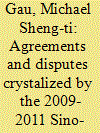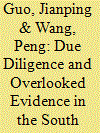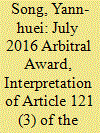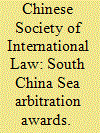| Srl | Item |
| 1 |
ID:
148527


|
|
|
|
|
| Summary/Abstract |
This paper examines the evidences used by the Tribunal for the South China Sea Arbitration to conclude that Philippines’ Submissions 3-4 and 6-7 reflect disputes. The Jurisdictional Award uses certain notes verbales sent by the Philippines and China in April 2011 for this purpose. However, the plain wording of these notes verbales negates the existence of disputes concerning the legal status of nine maritime features identified by those four Submissions. The Tribunal overlooks the agreement reached in these notes verbales that some geological features in the Kalayaan Islands Group may generate Exclusive Economic Zone and continental shelf, which serve to defeat Philippines’ Submissions 5, 8, and 9 as well as the Philippines’ theory that China invokes historical rights to justify its law enforcement activities in the entire region within the U-Shaped Line.
|
|
|
|
|
|
|
|
|
|
|
|
|
|
|
|
| 2 |
ID:
153272


|
|
|
|
|
| Summary/Abstract |
Many international legal experts believe that the Philippines v. China arbitration award of 12 July 2016 represents a game changer for South China Sea dispute settlements because the award has brought a breathtaking legal clarity to the complex disputes. This article argues that the sweeping nature of the award had a very paradoxical effect on Chinese policy. The arbitration ruling has led to the hardening of China’s claims, but it has also raised a new readiness among Chinese policymakers to renew negotiations. The sweepingness of the award makes it hard for the Philippines to reach a negotiated compromise with China on the basis of the award, but it also presents a surprising political opportunity in regional politics for the major actors involved to lower tensions and recalibrate policies. Although China’s new readiness to negotiate is welcome, the overall impact of the three-and-a-half-year-long arbitration is likely to create a deadlock in negotiations in the near future. Paradoxically, this may raise the importance of political and power-centred approaches to regional dispute settlements, as the legal approach embodied by arbitration continues to meet Chinese defiance.
|
|
|
|
|
|
|
|
|
|
|
|
|
|
|
|
| 3 |
ID:
169958


|
|
|
|
|
| Summary/Abstract |
This article analyzes China’s geopolitical maneuvers in the wake of the International Arbitral Court ruling over the South China Sea territorial disputes brought up by the Philippines. It finds that while the Philippines won the case in the sphere of international law, China won the geopolitical battle not only because the court does not have effective enforcement mechanisms but also because the international community lacked the will to induce significant compliance given China’s forceful rejection as a great power.
|
|
|
|
|
|
|
|
|
|
|
|
|
|
|
|
| 4 |
ID:
167522


|
|
|
|
|
| Summary/Abstract |
In the South China Sea Arbitration, the Tribunal decided that China had not breached the due diligence obligation to protect and preserve the marine environment under Articles 192 and 194(5) of the United Nations Convention on the Law of the Sea concerning Chinese fishers fishing with explosives, but that China had breached the same obligation regarding Chinese fishers harvesting endangered species. This article looks at how the Tribunal interpreted and applied the due diligence obligation and argues, from a Chinese perspective, that there were facts overlooked by the Tribunal that China could have presented to counter the evidence of the Philippines, which might have been enough to affect the decision on destructive fishing had China participated in the Arbitration.
|
|
|
|
|
|
|
|
|
|
|
|
|
|
|
|
| 5 |
ID:
152773


|
|
|
|
|
| Summary/Abstract |
Historic titles and historic rights have been a complicated issue in the law of the sea both conceptually and practically. The South China Sea Arbitration between the Philippines and China raised important issues regarding the contemporary relevance and validity of historic claims, and the relationship between the Law of the Sea Convention and historic rights. This articles examines historic rights and historic titles in the law of the sea in the light of the South China Sea Arbitration and evaluates the contribution of the Tribunal's Awards to the clarification of these concepts.
|
|
|
|
|
|
|
|
|
|
|
|
|
|
|
|
| 6 |
ID:
165119


|
|
|
|
|
| Summary/Abstract |
The interpretation of Article 121(3) of the 1982 U.N. Convention on the Law of the Sea (UNCLOS) was a key part of the Sino-Philippine Arbitration on the South China Sea Award issued in July 2016. This article uses the principles of treaty interpretation codified in Article 31 of the 1969 Vienna Convention on the Law of Treaties to evaluate the interpretation process. The Tribunal paid little attention to the text such as “rocks” in the plural form and overlooked the context of Article 121(3). The travaux préparatoires identified by the Tribunal was based on materials of doubtful weight.
|
|
|
|
|
|
|
|
|
|
|
|
|
|
|
|
| 7 |
ID:
160923


|
|
|
|
|
| Summary/Abstract |
This article discusses the insufficient consideration of the role of state practice in the interpretation and implementation of Article 121(3) of the UNCLOS by the Arbitral Tribunal in the South China Sea Arbitration Case. The article argues that the Tribunal's view on the “threshold” established and its conclusion that there was no evidence that an agreement existed based upon state practice on the interpretation of Article 121(3) are open to question.
|
|
|
|
|
|
|
|
|
|
|
|
|
|
|
|
| 8 |
ID:
148524


|
|
|
|
|
| Summary/Abstract |
In the South China Sea Arbitration between the Republic of the Philippines and the People’s Republic of China the Arbitral Tribunal constituted under Annex VII to the United Nations Convention on the Law of the Sea on 29 October 2015 issued its Award on Jurisdiction and Admissibility. The Tribunal rejected China’s objection that the disputes presented by the Philippines concerned, in essence, the extent of China’s territorial sovereignty in the South China Sea and were thus outside the Tribunal’s jurisdiction. The Tribunal found, inter alia, that the Philippines’ submissions reflected disputes between the parties concerning the interpretation or application of the Convention, that there was no other State indispensable to the proceedings, and that the Philippines had met the requirement under Article 283 of the Convention that the parties exchange views regarding the settlement of their disputes. This paper examines the Tribunal’s findings with regard to each and every of the Philippines’ 15 final submissions and demonstrates that some of its findings on the Tribunal’s jurisdiction and the admissibility of the Philippines’ claims are seriously flawed and based on procedural irregularities.
|
|
|
|
|
|
|
|
|
|
|
|
|
|
|
|
| 9 |
ID:
148528


|
|
|
|
|
| Summary/Abstract |
On 22 January 2013, the Department of Foreign Affairs of the Republic of the Philippines presented a note verbale to the Embassy of the People’s Republic of China in the Philippines, stating that the Philippines submitted a Notification and Statement of Claim in order to initiate compulsory arbitration proceedings under Article 287 and Annex VII of the United Nations Convention on the Law of the Sea (“Convention”) with respect to the dispute with China over “maritime jurisdiction” in the South China Sea. On 19 February 2013, the Chinese Government rejected and returned the Philippines’ note verbale together with the attached Notification and Statement of Claim. The Chinese Government has subsequently reiterated that it will neither accept nor participate in the arbitration thus initiated by the Philippines.
|
|
|
|
|
|
|
|
|
|
|
|
|
|
|
|
| 10 |
ID:
148523


|
|
|
|
|
| Summary/Abstract |
China claims “historic rights” over the islands and other maritime features in the South China Sea. The Philippines contests these claims on the ground that they are incompatible with the 1982 Convention on the Law of the Sea. It initiated arbitration under Annex VII of the (UNCLOS) for a declaratory judgment to that effect. China rejected the arbitral procedure in part because of its 2006 Declaration which excludes all such disputes from the compulsory dispute settlement procedure of the Convention. This paper examines the recent award of the Arbitral Tribunal accepting jurisdiction over the some of the submissions made by the Philippines. It finds that the UN Convention on the Law of the Sea has very little to offer to decide on issues of sovereignty and associated issues of overlapping maritime entitlements.
|
|
|
|
|
|
|
|
|
|
|
|
|
|
|
|
| 11 |
ID:
160149


|
|
|
|
|
| Summary/Abstract |
This critical Study analyzes in detail the award on jurisdiction and admissibility of 29 October 2015 and the award of 12 July 2016 in the South China Sea Arbitration. After briefly introducing the project and the Study and describing the background to and course of the South China Sea Arbitration and the position of the Chinese Government, the Study moves to address one by one the following matters: jurisdiction; admissibility; historic rights; the status of China’s Nansha Qundao and Zhongsha Qundao; the legality of China’s activities in the South China Sea; due process and evidence. The Study closes with the conclusion that the Tribunal’s many errors deprive its awards of validity and threaten to undermine the international rule of law. Included as annexes are five useful official documents of the Chinese government on jurisdiction, the two awards, China’s territorial sovereignty and maritime rights and interests in the South China Sea, and China’s adherence to the position of settling through negotiation the relevant disputes between China and the Philippines in the South China Sea.
|
|
|
|
|
|
|
|
|
|
|
|
|
|
|
|
| 12 |
ID:
148529


|
|
|
|
|
| Summary/Abstract |
Since 22 January 2013 when the Philippines unilaterally initiated arbitration with respect to certain issues in the South China Sea (Arbitration), China has maintained its solemn position that it would neither accept nor participate in the Arbitration, having stated that the tribunal constituted at the unilateral request of the Philippines (Arbitral Tribunal or Tribunal) manifestly has no jurisdiction. On 7 December 2014, the Chinese Government released the Position Paper of the Government of the People’s Republic of China on the Matter of Jurisdiction in the South China Sea Arbitration Initiated by the Republic of the Philippines (Position Paper), which elaborated on these positions. The Chinese Society of International Law strongly supports the positions of the Chinese Government.
|
|
|
|
|
|
|
|
|
|
|
|
|
|
|
|